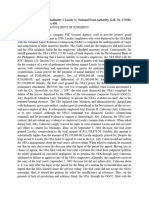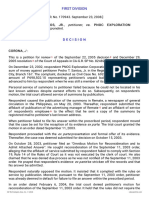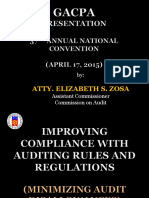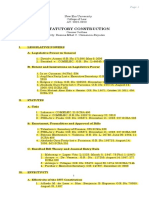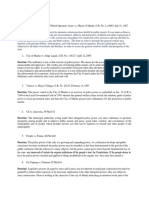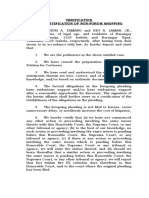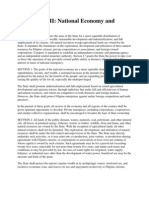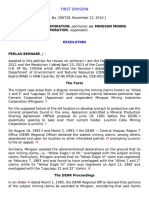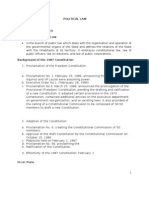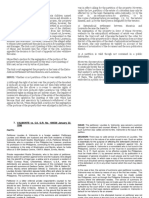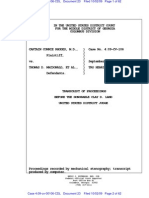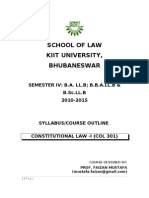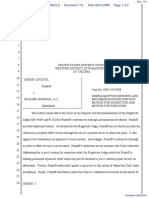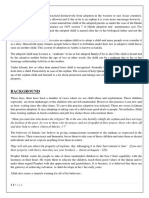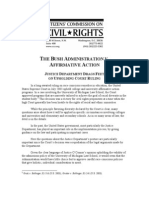Constitutional Law Lesson 1
Constitutional Law Lesson 1
Uploaded by
majid_marohombsarCopyright:
Available Formats
Constitutional Law Lesson 1
Constitutional Law Lesson 1
Uploaded by
majid_marohombsarOriginal Description:
Copyright
Available Formats
Share this document
Did you find this document useful?
Is this content inappropriate?
Copyright:
Available Formats
Constitutional Law Lesson 1
Constitutional Law Lesson 1
Uploaded by
majid_marohombsarCopyright:
Available Formats
CONSTITUTIONAL LAW LESSON 1
POLITICAL LAW
Is that branch of public law, which deals with the organization and
operations of the governmental organs of the State and defines the relations of
the State with the inhabitants of its territory.
In the present law curriculum prescribed by the Supreme Court, it
embraces:
Constitutional Law I and II
Administrative Law
Law of Public Officers
Election Law
Law on Municipal Corporations
PUBLIC LAW
CONSTITUTIONAL LAW
Is a study of the structure and powers of the Government of the Republic
of the Philippines, it also deals with certain basic concepts of Political Law, such
as the nature of the State, the supremacy of the Constitution, the separation of
powers, and the rule of the majority.
Expound
BASIC CONCEPTS OF POLITICAL LAW
NATURE OF THE STATE
THE STATE is a community of persons, more or less numerous,
permanently occupying a fixed territory, and possessed of an independent
government organized for political ends to which the great body of inhabitants
render habitual obedience.
4 ELEMENTS OF THE STATE (EXPOUND)
PEOPLE
People refers to the inhabitants of the State.
Requisites:
1. Numerous to be self sufficing
2. Numerous to defend selves
3. Small enough to administer and sustain
May develop shared characteristics, which will unite them into a nation
TERRITORY
Territory is the fixed portion of the surface of the earth inhabited by the people
of the State
Requisites:
1. Must not be too big to administer and defend
2. Must not be too small to unable to provide for the needs of the
population
Components:
1. Terrestrial domain land mass
2. Maritime and Fluvial domain inland and external waters
3. Aerial domain air space above the land and the waters
See Article I of the 1987 Constitution
GOVERNMENT
Government is the agency or instrumentality through which the will of the State
is formulated, expressed and realized.
Components (Expound):
1. Functions
2. Parens Patriae
3. De Jure and De Facto Governments
4. Government of the Philippines
5. Administration
SOVEREIGNTY
Sovereignty is the supreme and uncontrollable power inherent in a State by
which that State is governed.
NATURE OF THE CONSTITUTION
The Constitution is the basic and paramount law to which all other laws must
conform and to which all persons, including the highest officials of the land, must
defer. No act shall be valid, however noble its intentions, if it conflicts with the
Constitution.
SEPARATION OF POWERS
Under the principle of separation of powers, neither Congress, the President, nor
the Judiciary may encroach on fields allocated to the other branches of
government
The doctrine of separation of powers is intended to prevent a concentration of
authority in one person or group of persons that might lead to an irreversible
error or abuse in its exercise to the detriment of our republican institutions.
The principle of separation of powers ordains that each of the three great
branches of government has exclusive cognizance of and is supreme in matters
falling within its own constitutionally allocated sphere.
RULE OF MAJORITY
STATUTES
EXECUTIVE ORDERS
You might also like
- Outline in Constitutional Law 1 (Cruz)Document8 pagesOutline in Constitutional Law 1 (Cruz)Arvin Antonio Ortiz93% (44)
- Civil Pro 2 Cases 1-3Document14 pagesCivil Pro 2 Cases 1-3Ralph Ryan TooNo ratings yet
- Angeles - Dlsu V CA (Case Digest)Document1 pageAngeles - Dlsu V CA (Case Digest)Gennard Michael Angelo AngelesNo ratings yet
- Civ1 Digest Compilation Version4 CellesDocument91 pagesCiv1 Digest Compilation Version4 CellesMickey CellesNo ratings yet
- People v. Cabiles 341 SCRA 2000Document1 pagePeople v. Cabiles 341 SCRA 2000Eu CaNo ratings yet
- Service of Summons by PublicationDocument6 pagesService of Summons by PublicationJuris Anne LucmayonNo ratings yet
- Ocampo vs. EnriquezDocument1 pageOcampo vs. Enriquezjovani emaNo ratings yet
- Latin Maxims and PhrasesDocument5 pagesLatin Maxims and PhrasesLyn Dela Cruz DumoNo ratings yet
- 1 Fernandez Philosophy and LawDocument13 pages1 Fernandez Philosophy and Lawrbtr45j65zNo ratings yet
- Intro To Law SyllabusDocument2 pagesIntro To Law SyllabusRia TenerifeNo ratings yet
- Case Digest - PACU v. Secretary of Education 97 Phil 806Document2 pagesCase Digest - PACU v. Secretary of Education 97 Phil 806Nilfpe SalcedoNo ratings yet
- Effects of Trial in Absentia On The Right of The AccusedDocument4 pagesEffects of Trial in Absentia On The Right of The AccusedMariane Casil-TriaNo ratings yet
- 35 Meneses Vs MacalinoDocument11 pages35 Meneses Vs MacalinoKristine PaduaNo ratings yet
- Statutory Construction Final Exam QuestionsDocument3 pagesStatutory Construction Final Exam QuestionsartistcnvsNo ratings yet
- Bolos VDocument3 pagesBolos VAnonymous NqaBAyNo ratings yet
- Affidavit of Loss: IN WITNESS WHEREOF, I Have Hereunto Set My Hand This 3Document1 pageAffidavit of Loss: IN WITNESS WHEREOF, I Have Hereunto Set My Hand This 3Aidalyn MendozaNo ratings yet
- People V Echavez (1980) DigestDocument1 pagePeople V Echavez (1980) DigestRR FNo ratings yet
- Atty. Elizabeth S. ZosaDocument92 pagesAtty. Elizabeth S. ZosaKriston LipatNo ratings yet
- 2007 Bar Questions and Suggested Answers (POLITICAL LAW)Document3 pages2007 Bar Questions and Suggested Answers (POLITICAL LAW)nene_jmlNo ratings yet
- Selected Cases in Criminal Procedure: Prepared By: Atty. Charlie M. CabeDocument6 pagesSelected Cases in Criminal Procedure: Prepared By: Atty. Charlie M. CabeDayanski B-mNo ratings yet
- De Roxas - Truth Shall Set You FreeDocument17 pagesDe Roxas - Truth Shall Set You FreeMelvin PernezNo ratings yet
- Case Digest Constitution 1Document446 pagesCase Digest Constitution 1louela_lala08100% (1)
- G.R. No. 122855-MIWD V. CA PDFDocument8 pagesG.R. No. 122855-MIWD V. CA PDFLex Tamen CoercitorNo ratings yet
- Philosophy of Law - Reports PresentationDocument69 pagesPhilosophy of Law - Reports PresentationThe PsychenaldsterNo ratings yet
- Case 1 Aruelo V. Ca FactsDocument43 pagesCase 1 Aruelo V. Ca FactsAquiline ReedNo ratings yet
- STAT1 SYLLABUS (Monday 8-10PM)Document7 pagesSTAT1 SYLLABUS (Monday 8-10PM)maushi abinalNo ratings yet
- Reply To ComplaintDocument4 pagesReply To ComplaintWella JaneNo ratings yet
- 2023 Bar Local Personnel GuideDocument41 pages2023 Bar Local Personnel GuideMiko TabandaNo ratings yet
- San Beda College-Manila College of Law General PrinciplesDocument19 pagesSan Beda College-Manila College of Law General Principlesttyr4No ratings yet
- G.R. No. 104818Document18 pagesG.R. No. 104818Joemar MontemayorNo ratings yet
- Ejusdem Generis Real HandoutDocument1 pageEjusdem Generis Real HandoutLoury LuzadioNo ratings yet
- Constitutional Law 1 ReviewerDocument15 pagesConstitutional Law 1 ReviewerMa Jean Baluyo CastanedaNo ratings yet
- Estrada Vs EscritorDocument71 pagesEstrada Vs EscritorChingNo ratings yet
- Rabe Vs FloresDocument2 pagesRabe Vs FloresgerwinryanrabayaNo ratings yet
- Republic Vs Provincial Govt of Palawan GR No 170867 Dec 4 2018Document99 pagesRepublic Vs Provincial Govt of Palawan GR No 170867 Dec 4 2018JURIS UMAKNo ratings yet
- Ejection ComplaintDocument4 pagesEjection ComplaintYakisoba RamenNo ratings yet
- PP CasesDocument5 pagesPP CasesLylo BesaresNo ratings yet
- What Are The Duties of An Attorney?: Canon 1Document5 pagesWhat Are The Duties of An Attorney?: Canon 1Pam ChuaNo ratings yet
- A.C. No. 10548, December 10, 2014 Caroline Castañeda JIMENEZ, Complainant, v. ATTY. Edgar B. FRANCISCO, Respondent. Decision Mendoza, J.Document3 pagesA.C. No. 10548, December 10, 2014 Caroline Castañeda JIMENEZ, Complainant, v. ATTY. Edgar B. FRANCISCO, Respondent. Decision Mendoza, J.Luiza CapangyarihanNo ratings yet
- Statcon Final ExamDocument1 pageStatcon Final ExamRaakista18 SWNo ratings yet
- Verification and Certification of Non-Forum ShoppingDocument2 pagesVerification and Certification of Non-Forum ShoppingYNNA DERAYNo ratings yet
- Basic Legal Ethics SyllabusDocument3 pagesBasic Legal Ethics SyllabusAleph JirehNo ratings yet
- People V. Perfecto, 43 Phil 887Document3 pagesPeople V. Perfecto, 43 Phil 887Jess MonterasNo ratings yet
- Carale vs. AbarintosDocument13 pagesCarale vs. AbarintosRustom IbañezNo ratings yet
- Oposa V.factoranDocument2 pagesOposa V.factoranJoshua EscalanteNo ratings yet
- ISSUE SPOTTING in Law SchoolDocument18 pagesISSUE SPOTTING in Law Schoolarianne loise evangelistaNo ratings yet
- ARTICLE XII: National Economy and PatrimonyDocument5 pagesARTICLE XII: National Economy and PatrimonyPoseidon NipNo ratings yet
- JA EnglishDocument5 pagesJA EnglishDeness Caoili-Marcelo100% (1)
- Selanova v. Mendoza, A.M. No. 804-CJ, May 19, 1975 (64 SCRA 69) PDFDocument6 pagesSelanova v. Mendoza, A.M. No. 804-CJ, May 19, 1975 (64 SCRA 69) PDFLester AgoncilloNo ratings yet
- Law True or False Docx 1Document5 pagesLaw True or False Docx 1Lili esNo ratings yet
- In Re Petition For Change of Name And-Or Correction or Cancellation of Entry in Civil Registry of Julian Lin Carulasan WangDocument4 pagesIn Re Petition For Change of Name And-Or Correction or Cancellation of Entry in Civil Registry of Julian Lin Carulasan WangjenizacallejaNo ratings yet
- Apo Cement Corp. v. Mingson Mining Industries Corp., G.R. No. 206728 (Resolution), (November 12, 2014) )Document6 pagesApo Cement Corp. v. Mingson Mining Industries Corp., G.R. No. 206728 (Resolution), (November 12, 2014) )PreciousGanNo ratings yet
- Knock and AnnounceDocument8 pagesKnock and Announceperla v100% (1)
- PEOPLE Vs MARTI, GR 81561 Jan.18.1991 - Case Digest - CantoriaDocument2 pagesPEOPLE Vs MARTI, GR 81561 Jan.18.1991 - Case Digest - CantoriaGianna CantoriaNo ratings yet
- Cosino vs. People of The PhilippinesDocument3 pagesCosino vs. People of The PhilippinesMarvien BarriosNo ratings yet
- Political Law ReviewerDocument235 pagesPolitical Law ReviewerChevien Dioneza DavilaNo ratings yet
- 1st UnitDocument42 pages1st UnitSolomon ManggadNo ratings yet
- Outline in Constitutional Law 1 CruzDocument8 pagesOutline in Constitutional Law 1 CruzSCNo ratings yet
- Political ReviewerDocument28 pagesPolitical ReviewerKaren GinaNo ratings yet
- Philippine Government FinalDocument113 pagesPhilippine Government FinalDilg ConcepcionNo ratings yet
- Politics and Governance: What Is A State?Document5 pagesPolitics and Governance: What Is A State?Jay TomNo ratings yet
- Politics of Kinship (Political Dynasty, Alliances)Document9 pagesPolitics of Kinship (Political Dynasty, Alliances)Atheose Moanford100% (2)
- Preventive SuspensionDocument23 pagesPreventive SuspensionJulius Harvey Prieto BalbasNo ratings yet
- Law UG HonoursDocument48 pagesLaw UG HonoursnirobpaulgetitNo ratings yet
- Mauricia Alejandrino v. CADocument22 pagesMauricia Alejandrino v. CAAPRIL ANN BIGAYNo ratings yet
- Mayflower CompactDocument17 pagesMayflower CompactTRUMPET OF GOD100% (1)
- Betsy J. Peterson, RPR, CCR Federal Official Court Reporter Post Office Box 81 Columbus, Georgia 31902 (706) 317-3111Document62 pagesBetsy J. Peterson, RPR, CCR Federal Official Court Reporter Post Office Box 81 Columbus, Georgia 31902 (706) 317-3111the kingfishNo ratings yet
- Philippines: Act No. 613 of 1940, Philippine Immigration: National Legislative BodiesDocument22 pagesPhilippines: Act No. 613 of 1940, Philippine Immigration: National Legislative BodiesAnonymous iBVKp5Yl9ANo ratings yet
- Kls Constitutional Law I Course OutlineDocument24 pagesKls Constitutional Law I Course OutlineNisha AgarwalNo ratings yet
- 06 - Chapter 1Document19 pages06 - Chapter 1Vinay Kumar KumarNo ratings yet
- DO s2011 29Document5 pagesDO s2011 29Ron VillanuevaNo ratings yet
- French HistoriographyDocument5 pagesFrench Historiographykajsdkjqwel100% (1)
- Spitsyn Vs Morgan - Document No. 114Document2 pagesSpitsyn Vs Morgan - Document No. 114Justia.comNo ratings yet
- Ang Ladlad LGBT Party Vs Commission On Elections (COMELEC)Document5 pagesAng Ladlad LGBT Party Vs Commission On Elections (COMELEC)Raymond D. Conchu100% (1)
- Equity Center DistrictsDocument2 pagesEquity Center Districtsenm077486No ratings yet
- Seangio v. Reyes (2006)Document1 pageSeangio v. Reyes (2006)Steven JensenNo ratings yet
- (Legal Drafting) Group 1Document17 pages(Legal Drafting) Group 1FadhelNo ratings yet
- Globe Mackay Vs NLRCDocument1 pageGlobe Mackay Vs NLRCKelly EstradaNo ratings yet
- DBQ1985ADocument1 pageDBQ1985AVrinda DhongleNo ratings yet
- Kafala System in Muslim Law GarimaDocument6 pagesKafala System in Muslim Law GarimaGopichand MandavaNo ratings yet
- Brayshaw v. City of Tallahassee, Willie Meggs, Florida State Attorney, 42 Ps Response To Meggs Motion To DismissDocument27 pagesBrayshaw v. City of Tallahassee, Willie Meggs, Florida State Attorney, 42 Ps Response To Meggs Motion To DismissAmericanFreedomNo ratings yet
- Clemente V GSISDocument2 pagesClemente V GSISAnonymous wDganZNo ratings yet
- Different Governments Federal Confederal and Unitary PDFDocument2 pagesDifferent Governments Federal Confederal and Unitary PDFAli AsadNo ratings yet
- Chavez Vs JBCDocument4 pagesChavez Vs JBCjanmerNo ratings yet
- Alberto Gonzales Files - The Bush Administration V Affirmative ActionDocument10 pagesAlberto Gonzales Files - The Bush Administration V Affirmative ActionpolitixNo ratings yet
- Roma Drug v. RTCDocument2 pagesRoma Drug v. RTCSarah RosalesNo ratings yet
- G.R. No. 132244 September 14, 1999 GERARDO ANGAT, Petitioner, Republic of The Philippines, RespondentDocument4 pagesG.R. No. 132244 September 14, 1999 GERARDO ANGAT, Petitioner, Republic of The Philippines, RespondentCiara NavarroNo ratings yet
- 切結書Declaration 2013fallNTHUDocument3 pages切結書Declaration 2013fallNTHUazertytyty000No ratings yet
- Benazir Bhutto's WikipediaDocument29 pagesBenazir Bhutto's WikipediaAamir HussainNo ratings yet
- Proposal - Legal ResearchDocument4 pagesProposal - Legal ResearchNeva Bersamen BenitoNo ratings yet

